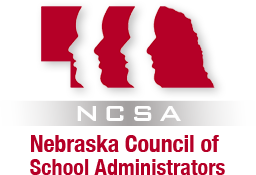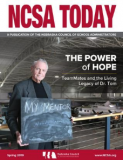State Principals Conference
December 8-9, 2016
Holiday Inn - Kearney, NE
Pre-registration is now closed. Please visit the on-site registration desk to register.
Hotel Information
Holiday Inn - Kearney
308-237-5971
$92.95
Schedule
Thursday, December 8, 2016
12:30 p.m. Registration & Exhibition Opens
1:00 p.m. Welcome - Jim Widdifield, NAESP President
Keynote Speaker: Attorney General Doug Peterson
A Generation At Risk
Nebraska students deserve the best future we are able to provide them through their families, communities and schools. Many forces are at work today to undermine or interfere with their development and growth. Recognizing the risks and informing communities of tangible steps to protect is an area of necessary collaboration.
2:15 p.m. Break & Exhibition Visit
2:45 p.m. Concurrent NSASSP and NAESP Law Sessions
4:30 p.m. Social at Nick's on the Bricks
6:00 p.m. Dinner on your own
Friday, December 9, 2016
8:00 a.m. Continental Breakfast & Exhibits Open
8:45 a.m. Welcome - Steve Adkisson, NSASSP President
9:00 a.m. Keynote Speaker: Kay Glidden and Jenny Brown (Resources)
Calmer Classrooms: Working with Traumatized Students
Thirteen of every 30 students in a classroom will have toxic stress from 3 or more Adverse Childhood Experiences (ACE’s). Toxic stress or trauma can involve events such as physical or emotional abuse, divorce, bullying, domestic violence, death in the family and medical trauma. Teen suicides doubled in Nebraska last year. Suicide is the second leading cause of death among youth ages 15-24, and the third leading cause for those 10-14 years old. Trauma can impact student learning, social interactions and self-regulation.
Kay and Jenny will discuss how trauma affects students, the ACE’s study, how to create a safe environment for all students and ways to avoid re-traumatizing practices. Specific classroom tools and strategies will be discussed to help staff engage all students in the learning process and support emotional self-regulation.
9:45 a.m. Break
10:15 a.m. Select-a-Session I
11:00 a.m. Break
11:15 a.m. Select-a-Session II
12:00 p.m. Awards Luncheon
1:15 p.m. Select-a-Session III
Sessions
Session I: 10:15-11:00
The Impact of Mandating the ACT Elsewhere
Deb Selby, John Baylor Prep
Beginning April 19, 2017, all Nebraska juniors will take the ACT exam instead of a NeSA exam. In other states that have mandated the ACT, scores drop precipitously the first year. Deb Selby of John Baylor Prep will show the rest of the story -- she'll share the data showing how scores rise over time after year one. An advantage of mandating the ACT is that it provides a great opportunity for some students, particularly lower-income students, to take a meaningful test that could make a real difference in their future. John Baylor Prep has provided ACT Prep to thousands of students and nearly 400 schools in 23 states. Deb can answer all your questions about score trends after implementing 100% testing, and provide strategies to maximize its benefit for your students.
Teaching and Assessing Students for 21st Century Skills (handout 1, handout 2, handout 3, handout 4)
Shalee Lindsey and Melissa Beberniss, Westridge Middle School
What does “career ready” really mean, according to the business world? Some of the most vital skills students require involve not only cognitive processes, but mindset, resilience, and outlook, along with the ability to interact responsibly. This session will give you a glimpse of what a 21st Century curriculum looks like, based on Robert Marzano’s book, Teaching and Assessing 21st Century Skills when it’s taught as a core subject or embedded into any class.
Strategies for Meeting Increasing Mental Health Needs with Existing Resources
Betsy Gomez and Jill McCaslin-Timmons, Ed.S. NCSP, Lincoln Public Schools
In this session, participants will learn about the multifaceted position of the school psychologist and what they can offer beyond academic testing. Participants will walk away with ideas and strategies to tackle mental health needs of scholars by restructuring and utilizing school psychologist time more efficiently and effectively. Participants will also hear how one elementary has restructured their school psychology.
Engaging Your School Community with Technology
Greg Borland, Fremont Public Schools
With all the technology available how can we use it to help us communicate with our internal and external school community more effectively? During this session, you will be introduced to a variety of ways to communicate with the several groups that you engage with on a regular basis. The session will provide you with specific ways that you can communicate effectively with parents, teachers, students, & fellow administrators with simple, free, and easy to use tools.
The Power of ICU - The End of Student Apathy and Reviving Engagement and Responsibility
Mitch Bartholomew, Kenny Loosvelt, and Kris Friesen, York Public Schools
Learn how York Public Schools has focused on student responsibility and apathy with the ICU (Intensive Care Unit) process. ICU has helped York Public Schools students, teachers, and administrators (grades 3-12) be more accountable for student achievement by implementing a process that requires teamwork and support for students. York Public Schools has adopted ICU’s theme, “Every Student Completes Every Quality Assignment” and has seen immediate results.
Session II: 11:15-12:00
School Building Leadership in Special Education
Steve Miliken and Amy Rhone, Nebraska Department of Education
Building-level leadership in special education is very important. This leads to many challenges for building principals. This conversation will focus on legal issues, including the essentials of compliance, behavior and instructional challenges in appropriate settings, and many of the IEP facilitation issues that are important for building leaders to know. Additional questions and thoughts from attendees will be welcomed.
Creating a Paperless School Improvement Profile
Jay Dostal, Kearney High School
Data is king and getting that information to your constituents in an easy and user-friendly way is critical. In this session, see how Kearney High School has moved to an online School Improvement Profile where important information about the school can be easily found and digested.
Closing Gaps for Students With a Disconnected Educational Journey
Matt McLaughlin, Kiowa Rogers, and Crystal Newhoff, Bayard Public Schools
For high mobility, at risk students with a disconnected educational journey, making solid educational gains can be a challenge. The challenge is greater when resources are limited and the migrant program consists of students in multiple grade levels with diverse needs. Find out how Bayard Public Schools and the ESU 13 Migrant Education Program implements an after school/summer migrant program to take students from struggling to thriving. We have found that persistence, hard work, determination, strong partnerships, and commitment to educating the whole child makes the difference for migrant children. Come learn how we have increased student achievement, cultural pride, and provided opportunities that make it a privilege to be a migrant kid in Bayard.
Principals as Change Agents
Teresa Perkins and Scott Ingwerson, Millard Public Schools
Supporting staff member's movement forward by building authentic relationships and understanding where their journey begins. The heavy-lifting of leading in a positive culture of change begins the building principal's mindset.
The PLC Process and Shared Leadership (handout 1, handout 2, handout 3)
Grant Norgaard, Tim Garcia, Kate Repass, Chad Lyons, and Jeff Gross, McCook Public Schools
How MPS harnessed the PLC process to increase student achievement districts-wide, earning "Excellent" ratings at the elementary and senior high levels of learning and recently receiving the National Blue Ribbon Award of Excellence for being an "Exemplary High Performing School" at McCook Elementary School. This breakout session will provide an overview of five focal points of the PLC process for increased learning and achievement:
Creating collaborative TEAMS
Development of the Essential Learning Objectives (ELO)
Developing locally created assessments
Immediate implementation of Response to Intervention (RtI)
Common Instructional Model
Session III: 1:15-2:00
What Teachers Learn about Technology Integration in Teacher Preparation Programs
Guy Trainin, University of Nebraska – Lincoln
Martonia Gaskill, University of Nebraska - Kearney
In this session, we will have a conversation about teacher preparation for technology integration in k12 classrooms. We will share the principles and objectives and the expectations from pre-service teachers at UNL, UNK, and . In the second part of the conversation, we aim to listen to administrators about the needs they see in new teachers. The conclusion of the conversation will be the development of 4-7 essentials that teacher preparation programs should emphasize.
Understanding Competency-Based Education, Personalized Learning, and Blended Learning
Dawn Ferreyra, ESU #3
You may have heard the terms, but what do they really mean? How are they implemented in the classroom or school? This session will help you differentiate between CBE, Personalized Learning, and Blended Learning, and demonstrate how they can work together for innovative learning.
From Pre-K to Elementary School: Elementary Principal Leadership and Successful Transitions
Dr. Josh Snyder, Elkhorn Public Schools
This session will share research results regarding the perceptions and expectations of public elementary school administrators in Nebraska and the role of the elementary principal in successful transitions from Pre-K to kindergarten education programs throughout the state. The overarching question for the research was: Do elementary principal's perceptions and expectations have an effect on transition plans for Pre-K to kindergarten children and families? The study provided information on elementary principal preparation for supervision and support of Pre-K students’ transition to kindergarten classrooms, knowledge of best practices related to early childhood education programs, factors that influence their level of support for such programs within their school and their role in the transition of Pre-K students to the elementary classroom setting.
Instructional Coaching without an Instructional Coach
Bobby Kelley and Tammy Schaefer, Cross County Community Schools
Instructional Coaching is one of the most beneficial job embedded professional development opportunities a teacher can receive to improve his or her skills in the classroom! However, many districts do not have the funding available to hire a full time instructional coach. During this session participants will be provided with a blueprint on how to effectively implement an instructional coaching process into their school district without spending any more money!! This blueprint will include all necessary materials to immediately go back to your school and begin the process of instructional coaching. This presentation is for all district and building level administrators wanting to learn more about the benefits of instructional coaching and how to implement the process!
Assistant Principal Roundtable
Charlie Hutzler, Norris High School
Cameron Soester, Milford High School
This discussion is open to new and experienced Assistant Principals. We will discuss current issues and trends related to the assistant principalship, in addition to sharing resources available to help you throughout the school year. Join us to add to the conversation and expand your Professional Learning Network. The agenda will likely include items such as instructional leadership, student discipline, time management, and other related topics. We look forward to seeing you there!
Exhibitors and Sponsors
Exhibit booths have SOLD OUT. There are sponsorship opportunities remaining. Please contact NCSA, 800-793-6272, for sponsorship information. All exhibitors and sponsors are handled on a first come first serve basis.
Any cancellation request must be received no later than Monday, December 5, 2016
*A 48 hour (2 business day) cancellation policy is in place for all events. To avoid being charged the full registration fee, please submit any requests to cancel your registration before the cancellation deadline. Please contact Michelle, michelle@ncsa.org, with all cancellation requests and inquiries. Please note: your registration fee will be refunded or waived ONLY if an event is cancelled due to inclement weather. Otherwise, the 48 hour (2 business day) cancellation policy remains in effect for all events.





















